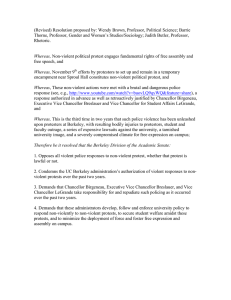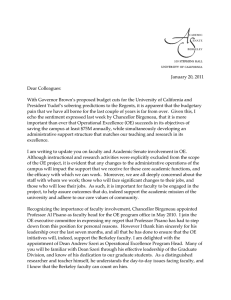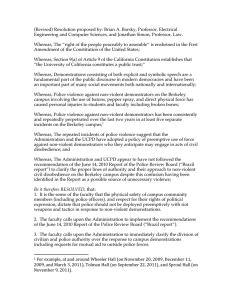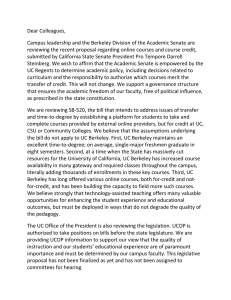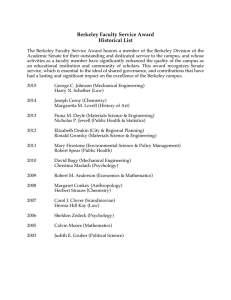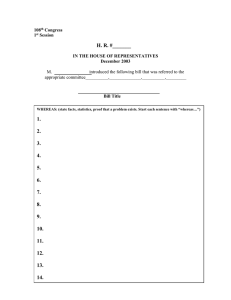Approved Minutes Berkeley Division of the Academic Senate Chevron Auditorium, International House
advertisement
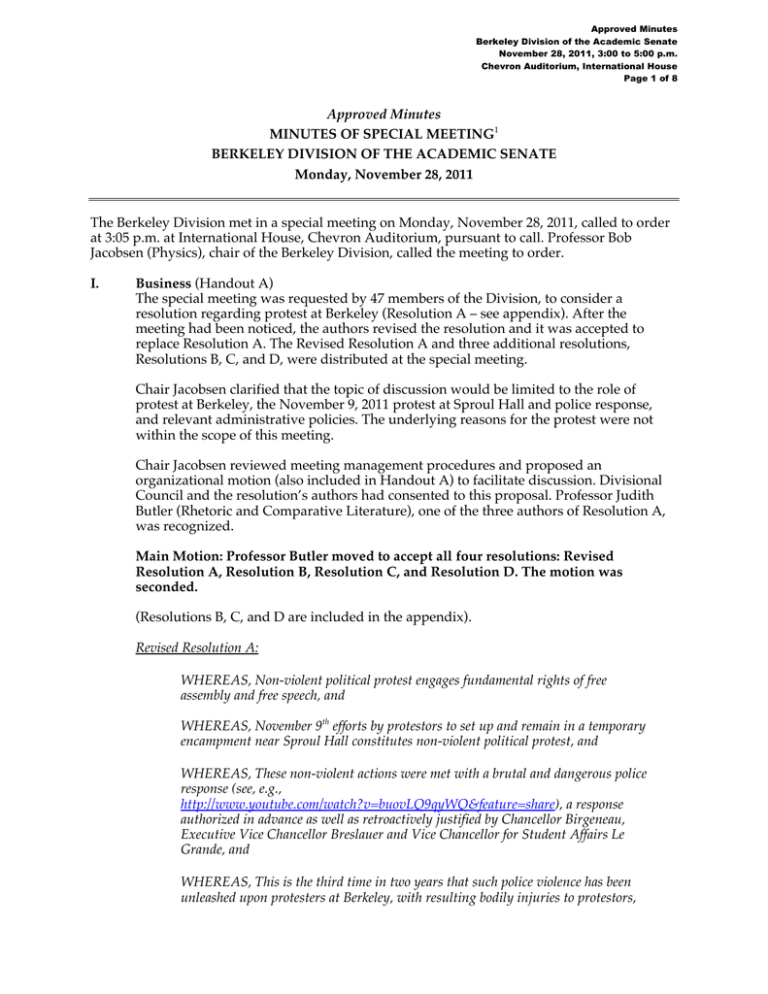
Approved Minutes Berkeley Division of the Academic Senate November 28, 2011, 3:00 to 5:00 p.m. Chevron Auditorium, International House Page 1 of 8 Approved Minutes MINUTES OF SPECIAL MEETING1 BERKELEY DIVISION OF THE ACADEMIC SENATE Monday, November 28, 2011 The Berkeley Division met in a special meeting on Monday, November 28, 2011, called to order at 3:05 p.m. at International House, Chevron Auditorium, pursuant to call. Professor Bob Jacobsen (Physics), chair of the Berkeley Division, called the meeting to order. I. Business (Handout A) The special meeting was requested by 47 members of the Division, to consider a resolution regarding protest at Berkeley (Resolution A – see appendix). After the meeting had been noticed, the authors revised the resolution and it was accepted to replace Resolution A. The Revised Resolution A and three additional resolutions, Resolutions B, C, and D, were distributed at the special meeting. Chair Jacobsen clarified that the topic of discussion would be limited to the role of protest at Berkeley, the November 9, 2011 protest at Sproul Hall and police response, and relevant administrative policies. The underlying reasons for the protest were not within the scope of this meeting. Chair Jacobsen reviewed meeting management procedures and proposed an organizational motion (also included in Handout A) to facilitate discussion. Divisional Council and the resolution’s authors had consented to this proposal. Professor Judith Butler (Rhetoric and Comparative Literature), one of the three authors of Resolution A, was recognized. Main Motion: Professor Butler moved to accept all four resolutions: Revised Resolution A, Resolution B, Resolution C, and Resolution D. The motion was seconded. (Resolutions B, C, and D are included in the appendix). Revised Resolution A: WHEREAS, Non-violent political protest engages fundamental rights of free assembly and free speech, and WHEREAS, November 9th efforts by protestors to set up and remain in a temporary encampment near Sproul Hall constitutes non-violent political protest, and WHEREAS, These non-violent actions were met with a brutal and dangerous police response (see, e.g., http://www.youtube.com/watch?v=buovLQ9qyWQ&feature=share), a response authorized in advance as well as retroactively justified by Chancellor Birgeneau, Executive Vice Chancellor Breslauer and Vice Chancellor for Student Affairs Le Grande, and WHEREAS, This is the third time in two years that such police violence has been unleashed upon protesters at Berkeley, with resulting bodily injuries to protestors, Approved Minutes Berkeley Division of the Academic Senate November 28, 2011, 3:00 to 5:00 p.m. Chevron Auditorium, International House Page 2 of 8 student and faculty outrage, a series of expensive lawsuits against the university, a tarnished university image, and a severely compromised climate for free expression on campus; THEREFORE be it resolved that the Berkeley Division of the Academic Senate: 1. Opposes all violent police responses to non-violent protest, whether that protest is lawful or not. 2. Condemns the UC Berkeley administration’s authorization of violent responses to non-violent protests over the past two years. 3. Demands that Chancellor Birgeneau, Executive Vice Chancellor Breslauer, and Vice Chancellor Le Grande take responsibility for and repudiate such policing as it occurred over the past two years. 4. Demands that these administrators develop, follow and enforce university policy to respond non-violently to non-violent protests, to secure student welfare amidst these protests, and to minimize the deployment of force and foster free expression and assembly on campus. Proposed by: Wendy Brown, Professor, Political Science; Barrie Thorne, Professor, Gender and Women’s Studies/Sociology; and Judith Butler, Professor, Rhetoric Organizational motion: Professor Butler moved an organizational motion, which was seconded. Move that the meeting commit the current resolution to a quasi-committee of the whole for discussion, subject to the following rules: *) The committee of the whole shall end at 4PM, or when no members wish to speak, whichever occurs first *) After preliminary speakers, each speaker shall have no more than 3 minutes. No member may speak again while others are waiting to speak for the first time. Amendment to the organizational motion: It was moved, and seconded, to shorten the speakers’ time from three minutes to two. Vote: Majority in favor. Vote: The organizational motion as amended passed unanimously. Discussion: Quasi-committee of the whole began with Professor Butler’s presentation of the Revised Resolution A. (The Senate had been unable to distribute the revision in advance of the meeting due to campuswide technical problems). Preliminary speakers were introduced; Chancellor Robert Birgeneau and Executive Vice Chancellor and Provost (EVCP) George Breslauer discussed actions taken in anticipation of the November 9 protest. The Chancellor has called for an official review of the incident. EVCP Breslauer invited the campus community to engage with him over the next few months in discussion about campus policies regarding nonviolent protests. Approved Minutes Berkeley Division of the Academic Senate November 28, 2011, 3:00 to 5:00 p.m. Chevron Auditorium, International House Page 3 of 8 Vice Chancellor for Student Affairs Harry Le Grande, Graduate Assembly President Bahar Navab and ASUC Vice President for Academic Affairs Julia Joung also spoke. Procedural motion: Chair Jacobsen proposed to recommit to quasi-committee of the whole for an additional 15 minutes. Vote: The procedural motion was approved by consensus. Discussion: Highlights of the discussion included the following points: Speakers called upon the administration to take responsibility for the November 9 incident. Changes to administrative policies are needed to prohibit the use of force against nonviolent protestors, and the PRB report recommendations must be implemented. The four resolutions address different aspects of the issue and are complementary. If the main motion fails because of problems with some of the resolutions, Resolution C is a good alternative as it focuses on the core concerns with the November 9 incident. The faculty should unite in support of the right to nonviolent expression. More faculty should be present at future protests as observers. Student opinion and protest against the state’s divestment in higher education is valid and should be given consideration. Chair Jacobsen noted the need to preserve adequate time in which to dispose of the resolutions. He suggested closing the speaker queue, ending quasi-committee of the whole immediately, or extending the meeting. There were objections to extending the meeting past 5:00 PM due to childcare responsibilities of some faculty. It was the consensus of the body to limit speakers to those in line and to shorten their speaking times from two minutes to one. When the 15-minute extension of quasi-committee of the whole had expired, the Division was called back into session. Professor Butler called the question and it was seconded. Motion: To close debate: Vote: Passed with a two-thirds majority. The main motion passed. Vote: 336 in favor; 34 opposed Motion: It was moved, and seconded, to submit the main motion above to a mail ballot of the Division. Discussion: Chair Jacobsen clarified that a subsequent mail ballot of the entire Division would prevail and could reverse the vote just taken. A straw vote was taken and was inconclusive. Approved Minutes Berkeley Division of the Academic Senate November 28, 2011, 3:00 to 5:00 p.m. Chevron Auditorium, International House Page 4 of 8 A parliamentary inquiry was raised at this point, which objected to further action on the main motion since the Division chair had already declared the motion passed. Parliamentarian Vogel affirmed that a vote could be taken at the meeting and if the motion passed, the parliamentary inquiry could be resolved after the meeting, but before the mail ballot was conducted. Organizational Motion: It was moved, and seconded, to recommit to quasi-committee of the whole to facilitate discussion on whether to hold a mail ballot. Vote: The organizational motion was defeated by a majority. The motion for a mail ballot was defeated. Vote: 165 in favor; 218 opposed II. Other matters authorized by unanimous consent of the voting members present None Motion to adjourn was moved, and seconded. Without objection, the meeting was adjourned at 4:45 p.m. Gary Holland Secretary, Berkeley Division Handout A: Proposed Organizational Motion; Revised Resolution A: “Senate resolution on administrative authorization and justification of police violence against non-violent campus protestors,” proposed by Professors Wendy Brown (Political Science), Barrie Thorne (Gender and Women’s Studies/Sociology) and Judith Butler (Rhetoric)]; Resolution B (revised) proposed by Professors Brian Barsky (EECS) and Jonathan Simon (Law); Resolution C proposed by Professors David Hollinger (History) and Thomas Laqueur (History); Resolution D proposed by Professor Kurt C. Organista (Social Welfare). Approved Minutes Berkeley Division of the Academic Senate November 28, 2011, 3:00 to 5:00 p.m. Chevron Auditorium, International House Page 5 of 8 APPENDIX: RESOLUTION A: as noticed (replaced by Revised Resolution A) Whereas, Non-violent political protest engages fundamental rights of free assembly and free speech, and Whereas, November 9th efforts by protestors to set up and remain in a temporary encampment near Sproul Hall constitutes non-violent political protest, and Whereas, These non-violent actions were met with a brutal and dangerous police response (see, e.g., http://www.youtube.com/watch?v=buovLQ9qyWQ&feature=share), a response authorized in advance as well as retroactively justified by Chancellor Birgeneau, Executive Vice Chancellor Breslauer and Vice Chancellor for Student Affairs Le Grande, and Whereas, This is the third time in two years that such police violence has been unleashed upon protesters at Berkeley, with resulting bodily injuries to protestors, student and faculty outrage, a series of expensive lawsuits against the university, a tarnished university image, and a severely compromised climate for free expression on campus; Therefore be it Resolved that the Berkeley Division of the Academic Senate has lost confidence in the ability of Chancellor Birgeneau, EVC Breslauer and VC Le Grande to respond appropriately to non-violent campus protests, to secure student welfare amidst these protests, to minimize the deployment of force and to respect freedom of speech and assembly on the Berkeley campus. Proposed by: Professors Judith Butler (Rhetoric), Wendy Brown (Political Science), and Barrie Thorne (Gender and Women’s Studies/Sociology). On November 24, 2011, the Revised Resolution A was transmitted with the accompanying explanation: Dear Academic Senate Colleagues, We write as authors of the “Senate Resolution on Administrative Authorization and Justification of Police Violence Against Non-Violent Campus Protestors” that triggered the call for a special meeting of the Academic Senate on Monday, November 28, 2011. We formulated this resolution in the immediate aftermath of police violence against UC protestors on November 9th. Since that time, we have learned that our resolution is being misconstrued in two important ways. First, some have misread the resolution as unqualifiedly defending the Occupy Cal encampment and as arguing that students have the right to pitch tents on campus whenever and wherever they like. Second, some have misread the resolution as proposing a blanket “no-confidence” vote on three administrators, effectively soliciting their resignations. Neither of these positions or effects was our intention. Rather, we are concerned about a pattern of violent police responses to non-violent protests (three Approved Minutes Berkeley Division of the Academic Senate November 28, 2011, 3:00 to 5:00 p.m. Chevron Auditorium, International House Page 6 of 8 instances in two years) on our campus, and we are calling on the Senate to bring such responses to an immediate end. On the first matter, let us simply clarify: The resolution has no position on when and whether tents and encampments may be permitted on campus but does maintain that tents are non-violent. On the second matter, we have chosen to exercise our authorial prerogative to amend the proposed resolution. The “Whereas” clauses remain unchanged but we have revised the “Resolved” clause as follows: [See Item I, Main Motion, in the minutes of this special meeting for the full text of the revised resolution.] The full resolution, revised, is attached to this email. We look forward to a civil, thoughtful and productive discussion on Monday. Very best, Wendy Brown Judith Butler Barrie Thorne RESOLUTION B Whereas, The “right of the people peaceably to assemble” is enshrined in the First Amendment of the Constitution of the United States; Whereas, Section 9(a) of Article 9 of the California Constitution establishes that “the University of California constitutes a public trust;” Whereas, Demonstrations consisting of both explicit and symbolic speech are a fundamental part of the public discourse in modern democracies and have been an important part of many social movements both nationally and internationally; Whereas, Police violence against non-violent demonstrators on the Berkeley campus involving the use of batons, pepper spray, and direct physical force has caused personal injuries to students and faculty including broken bones; Whereas, Police violence against non-violent demonstrators has been consistently and repeatedly perpetrated over the last two years in at least five separate incidents on the Berkeley campus;1 Whereas, The repeated incidents of police violence suggest that the Administration and the UCPD have adopted a policy of preemptive use of force against non-violent demonstrators who they anticipate may engage in acts of civil disobedience; and Whereas, The Administration and UCPD appear to have not followed the recommendation of the June 14, 2010 Report of the Police Review Board (“Brazil report”) to clarify the proper lines of authority and their approach to non-violent civil disobedience on the Berkeley campus despite this confusion having been identified in the Report as a possible source of unnecessary violence; Approved Minutes Berkeley Division of the Academic Senate November 28, 2011, 3:00 to 5:00 p.m. Chevron Auditorium, International House Page 7 of 8 Be it therefore RESOLVED, that: 1. It is the sense of the faculty that the physical safety of campus community members (including police officers), and respect for their rights of political expression, dictate that police should not be deployed preemptively with riot weapons and tactics in response to non-violent demonstrations. 2. The faculty calls upon the Administration to implement the recommendations of the June 14, 2010 Report of the Police Review Board (“Brazil report”). 3. The faculty calls upon the Administration to immediately clarify the division of civilian and police authority over the response to campus demonstrations including requests for mutual aid to outside police forces. 4. The faculty calls upon the Administration to make public the specific conditions under which it is prepared to authorize UCPD (as well as other forces operating under mutual aid) to use weapons and forceful tactics including, but not limited to, batons, pepper spray, tear gas, rubber bullets, tasers, flash-bang grenades, and pressure point grips, against demonstrators engaged in non-violent actions including linking arms and other forms of passive resistance to arrest. 5. The faculty calls upon the Administration to announce that it will not authorize the use of such forceful tactics to prevent or preempt the formation of any assembly deemed unlawful that is composed in substantial part of students, faculty, or staff, and that remains non-violent. 6. The faculty recommends that if a demonstration turns into an unlawful assembly (e.g., an occupation of a building) then the Administration should engage in dialogue, communication, and negotiation as the primary and preferred resolution approach. 7. The faculty recommends that if and when arrests are deemed necessary to restore core university functions, the Administration not authorize the preemptive or disproportionate use of weapons and forceful tactics including, but not limited to, batons, pepper spray, tear gas, rubber bullets, tasers, flash-bang grenades, and pressure point grips. 8. The faculty recommends that following any incident in which forcible methods were used, the Chancellor should convene a public meeting with a minimum of delay to explain the rationale of the decision to employ them. 9. The Berkeley Division of the Academic Senate shall establish a Senate Committee on Demonstrations and Student Actions composed solely of faculty members to consult with the Administration, UCPD, and students. 1 For example, at and around Wheeler Hall (on November 20, 2009, December 11, 2009, and March 3, 2011), Tolman Hall (on September 22, 2011), and Sproul Hall (on November 9, 2011). Proposed by: Brian A. Barsky, Professor, Electrical Engineering and Computer Sciences, and Jonathan Simon, Professor, Law Approved Minutes Berkeley Division of the Academic Senate November 28, 2011, 3:00 to 5:00 p.m. Chevron Auditorium, International House Page 8 of 8 RESOLUTION C The Berkeley Division of the Academic Senate of the University of California hereby condemns the over-reaction of police to demonstrations on our campus on November 9; formally alerts the Chancellor and those who report to him that this incident has greatly diminished confidence in the Campus’s leadership; calls upon the Chancellor to institute special training for police forces employed on campus to deal with acts of political expression and civil disobedience in the University and, more generally, to immediately implement the recommendations of the Police Review Board (The Brazil Report) as issued on June 14, 2010. Proposed by: David Hollinger, Professor, History, and Thomas Laqueur, Professor, History RESOLUTION D Whereas, nonviolent political protest engages fundamental rights of free assembly and free speech, and Whereas, the campus has established time, place, and manner guidelines by which it encourages such activities, and Whereas, protesters may sometimes engage in political noncooperation which includes acts of civil disobedience – including the deliberate, open and peaceful violation of particular laws, decrees, regulations, and Whereas, there is a clear chain of command ending with the Chancellor, which implements training and deployment of police to respond appropriately to protests, and Whereas, campuses should exercise restraint in responding to peaceful protests and seek to resolve the situation through dialogue, and Whereas, we are outraged by the brutal and dangerous police responses against members of the University community at UC Berkeley and other campuses, Therefore be it Resolved that the Berkeley Division of the Academic Senate 1) calls upon the Chancellor, EVCP, and Chief of Police to officially apologize to the campus community for the behavior of the UCPD on Nov. 9, 2011 2) calls for immediate revision of policies and practices to minimize the danger of excessive use of force by the police, and to better train the police to employ nonviolent law enforcement that respects the rights of nonviolent protesters 3) affirms its support for the right of free speech and peaceful protest by all members of the University community 4) affirms its strong opposition to the State’s disinvestment in higher education, which is at the root of the student protests. Proposed by: Kurt C. Organista, Professor, Social Welfare
